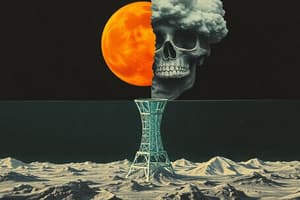Podcast
Questions and Answers
What occurs when a substance undergoes a phase change from solid to liquid?
What occurs when a substance undergoes a phase change from solid to liquid?
- Molecules release heat energy
- Molecules stop moving altogether
- Molecules speed up and move farther apart (correct)
- Molecules slow down and move closer together
What is the temperature at which water boils?
What is the temperature at which water boils?
- 100°C, 212°F, or 373 K (correct)
- 50°C, 122°F, or 323 K
- -273.15°C, -459.67°F, or 0 K
- 0°C, 32°F, or 273 K
What is the process called when a substance changes from a gas to a liquid?
What is the process called when a substance changes from a gas to a liquid?
- Condensation (correct)
- Vaporization
- Evaporation
- Melting
What happens to the molecules during the process of vaporization?
What happens to the molecules during the process of vaporization?
What is the term for the lowest possible temperature, at which all matter stops moving?
What is the term for the lowest possible temperature, at which all matter stops moving?
What is the process called when a substance changes from a solid to a gas, without going through the liquid phase?
What is the process called when a substance changes from a solid to a gas, without going through the liquid phase?
Flashcards are hidden until you start studying




